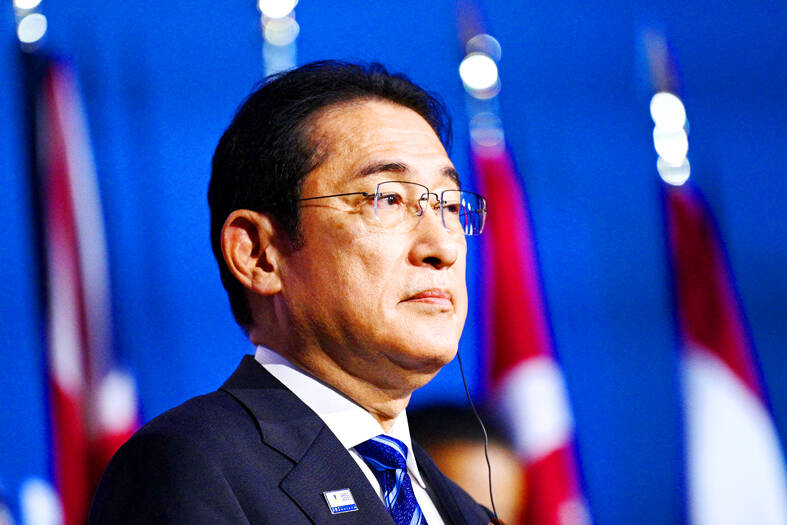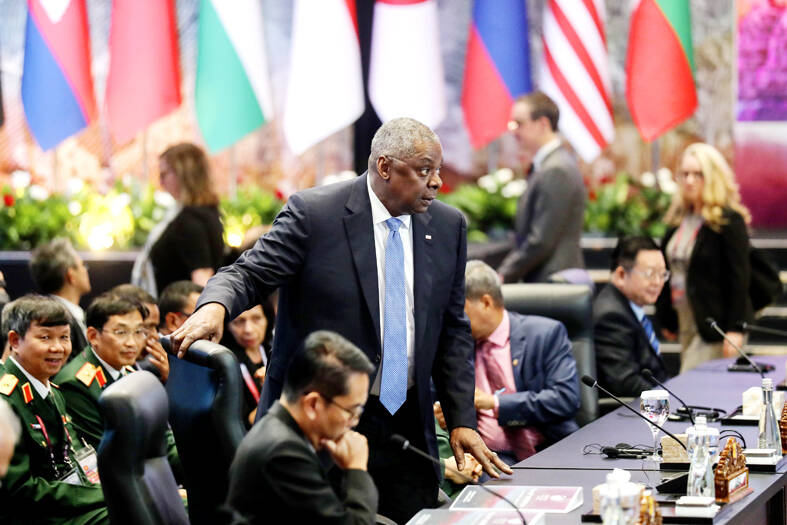Japanese Prime Minister Fumio Kishida on Thursday underscored the importance of peace and stability in the Taiwan Strait during a meeting with Chinese President Xi Jinping (習近平), while US Secretary of Defense Lloyd Austin reaffirmed the US’ commitment to support Taiwan’s self-defense capacity.
Kishida met with Xi for about an hour in San Francisco, where both leaders attended the APEC summit, the Japanese Ministry of Foreign Affairs said in a news release.
Kishida reiterated that cross-strait peace and stability are “extremely important” to the international community, including Japan, it said.

Photo: AFP
In Taipei, the Ministry of Foreign Affairs yesterday expressed gratitude to the Japanese leader for voicing concern over Taiwanese issues, adding that safeguarding peace in the Taiwan Strait has become the international consensus.
Meanwhile, Austin told reporters on the sidelines of the ASEAN Defense Ministers’ Plus conference in Jakarta that “with the Taiwan Relations Act, we are committed to doing what’s necessary to help Taiwan acquire the means to defend itself,” the Nikkei Asia reported yesterday.
Austin’s comment came after US President Joe Biden met with Xi on Wednesday on the sidelines of the APEC summit in San Francisco.

Photo: EPA-EFE
During the meeting, Xi urged the US to demonstrate its stance of not supporting Taiwanese independence through concrete action and to stop arming Taiwan, China’s state-run Xinhua news agency reported.
However, Biden said that the US would continue to arm Taiwan as a deterrent against any attempt by China to use force to invade the nation, The Associated Press reported.
“I don’t think that anything ... that both leaders discussed today [Wednesday] would cause that to move in a different direction,” the Nikkei Asia quoted Austin as saying.
Austin welcomed the resumption of military-to-military communication and the intention to stabilize the tense US-China relationship after their leaders’ meeting, but added that Washington would remain vigilant on the threat posed by China, it reported.
Austin reiterated that any unilateral change of the “status quo” in the Taiwan Strait is “undesirable,” as such a conflict would have global impacts, it said.
The US would keep expediting the delivery of weapons to Taiwan and has been working to resolve a backlog of arms orders as it assesses China’s capability to invade Taiwan, he said.
The ministry welcomed Austin’s statement, saying that the Biden administration has repeatedly stressed its “rock solid” security commitment to Taiwan at several bilateral and multilateral events since Biden took office in 2021.
Austin’s remark further demonstrated the US’ firm support for the safety of Taiwan, and peace and stability in the Taiwan Strait, it said.
As a responsible member of the Indo-Pacific region and the international community, Taiwan is to continue to strengthen its self-defense capabilities and bolster the Taiwan-US security partnership, it said.
The nation is also to work closely with like-minded countries to jointly safeguard cross-strait peace and stability, as well as freedom, openness and prosperity in the Indo-Pacific region, the ministry said.
In addition to calling on the US to stop arming Taiwan, Xi said that Washington should “support China’s peaceful reunification” with Taiwan, Xinhua reported.
US National Security Council Senior Director for China and Taiwan Affairs Sarah Beran yesterday told an online briefing that Biden “made clear” that Chinese military coercion against Taiwan is “absolutely unacceptable.”
Not supporting Taiwanese independence while underscoring the importance of maintaining peace and stability as well as the “status quo” in the Taiwan Strait has long been the US policy, she said, adding: “I think we’re very clear that our policy has not changed.”
Regarding January’s presidential and legislative elections, US National Security Council Coordinator for the Indo-Pacific Kurt Campbell on Thursday told Taiwanese media that Biden spoke about Taiwan’s elections during his discussions with Xi.
“It was very clear with President Xi that our determination to maintain peace and stability across the Taiwan Strait remains strong,” Campbell said, adding that Biden warned China not to interfere in Taiwan’s elections, and expressed his belief in the value of Taiwan’s democracy and elections.
Additional reporting by CNA

AIR SUPPORT: The Ministry of National Defense thanked the US for the delivery, adding that it was an indicator of the White House’s commitment to the Taiwan Relations Act Deputy Minister of National Defense Po Horng-huei (柏鴻輝) and Representative to the US Alexander Yui on Friday attended a delivery ceremony for the first of Taiwan’s long-awaited 66 F-16C/D Block 70 jets at a Lockheed Martin Corp factory in Greenville, South Carolina. “We are so proud to be the global home of the F-16 and to support Taiwan’s air defense capabilities,” US Representative William Timmons wrote on X, alongside a photograph of Taiwanese and US officials at the event. The F-16C/D Block 70 jets Taiwan ordered have the same capabilities as aircraft that had been upgraded to F-16Vs. The batch of Lockheed Martin

GRIDLOCK: The National Fire Agency’s Special Search and Rescue team is on standby to travel to the countries to help out with the rescue effort A powerful earthquake rocked Myanmar and neighboring Thailand yesterday, killing at least three people in Bangkok and burying dozens when a high-rise building under construction collapsed. Footage shared on social media from Myanmar’s second-largest city showed widespread destruction, raising fears that many were trapped under the rubble or killed. The magnitude 7.7 earthquake, with an epicenter near Mandalay in Myanmar, struck at midday and was followed by a strong magnitude 6.4 aftershock. The extent of death, injury and destruction — especially in Myanmar, which is embroiled in a civil war and where information is tightly controlled at the best of times —

Taiwan was ranked the fourth-safest country in the world with a score of 82.9, trailing only Andorra, the United Arab Emirates and Qatar in Numbeo’s Safety Index by Country report. Taiwan’s score improved by 0.1 points compared with last year’s mid-year report, which had Taiwan fourth with a score of 82.8. However, both scores were lower than in last year’s first review, when Taiwan scored 83.3, and are a long way from when Taiwan was named the second-safest country in the world in 2021, scoring 84.8. Taiwan ranked higher than Singapore in ninth with a score of 77.4 and Japan in 10th with

SECURITY RISK: If there is a conflict between China and Taiwan, ‘there would likely be significant consequences to global economic and security interests,’ it said China remains the top military and cyber threat to the US and continues to make progress on capabilities to seize Taiwan, a report by US intelligence agencies said on Tuesday. The report provides an overview of the “collective insights” of top US intelligence agencies about the security threats to the US posed by foreign nations and criminal organizations. In its Annual Threat Assessment, the agencies divided threats facing the US into two broad categories, “nonstate transnational criminals and terrorists” and “major state actors,” with China, Russia, Iran and North Korea named. Of those countries, “China presents the most comprehensive and robust military threat